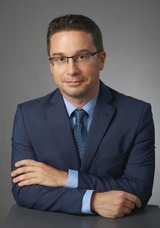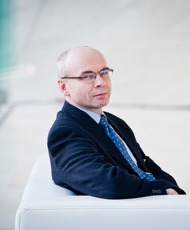The Scientific Board is the advisory body of the Centre Director. The task of the Board includes in particular submitting proposals for priority research areas of the Centre
Professor of sociology, social anthropology and European Studies at the Jagiellonian University in Kraków, Poland. Founder of the Institute for European Studies at the Jagiellonian University, and one of the main authors of the European Studies curriculum in Poland. Dean of the Faculty of International and Political Studies, Jagiellonian University, where he also holds a UNESCO Chair in Education about the Holocaust.
His research interests cover issues such as nationalism, minorities and ethnicity, the development of European citizenship, migration, the cultural construction of identities, collective memory and cultural heritage as well as the development of the idea of Europe. Professor Mach has been leading teams of researchers in the Polish National Science Centre and EU supported projects, including 6th FrameWork and a Horizon 2020.
His publications include Symbols, Conflict and Identity. Essays in Political Anthropology. Albany: State University of New York Press 1993; Niechciane miasta. Migracja i tożsamość społeczna. Kraków: Universitas 1998; Poland’s National Memory of the Holocaust and Its Identity in an Expended Europe [in:] J. Ambrosewicz-Jacobs (ed.); The Holocaust. Voices of Scholars, Austeria, Kraków 2009: 61–70; Between old Fears and New Challenges. The Polish Debate on Europe [in:] K. Nicolaidis, and J. Lacroix (eds.), European Stories. How National Intellectuals Debate Europe, Oxford: Oxford University Press 2010: 221–240; (with M. Góra), Situating the demos of a European democracy [in:] E.O.Eriksen and J.E.Fossum (eds.), Rethinking Democracy and the European Union, London and New York: Routledge, 2012: 159–178; (with M.Góra and H-J. Trenz), Democtarization and the Struggle for the Recognition of Memory and Heritage in the European Frame of Reference, [in:] K. Kowalski i B. Tornquist-Plewa (eds.) The Europeanization of Heritage and Memories in Poland and Sweden, Kraków, Jagiellonian University Press, 2016: 265–271; Local Community, Power and European Integration, (ed.) 2016, Frankfurt: Peter Lang, The Polish elites’ struggle for recognition of the experience of Communism in the European Union, [in:] A. T. Sindbæk, B. Törnquist-Plewa (eds.), The twentieth century in European memory: transcultural mediation and reception, Leiden Boston: Brill, 2017: 56–82 (with M. Góra); Remembering and forgetting the culture of Others: the inclusion and exclusion of German and Jewish heritage in Poland, [in:] Krzysztof Kowalski, Łucja Piekarska-Duraj and Barbara Törnquist-Plewa (ed.) Narrating Otherness in Poland and Sweden. European Heritage as a Discourse of Inclusion and Exclusion, Berlin, Bern, Bruxelles, New York, Oxford, Warszawa, Wien: Peter Lang, 2019: 301–313.

Executive Director of Taube Philanthropie
Associate Professor of political science and European studies at the Institute of European Studies of the Jagiellonian University. Her research deals with the legitimacy and contestation in external relations of the European Union, EU actorness in international relations especially in the EU’s close neighborhood as well as on democracy challenges in the European Union. She has published several journal articles (Cambridge Review of International Relations, East European Politics & Societies, European Security, Religion, State & Society), book chapters and co-edited volumes.
Professor of the Institute of Polish Studies at the Jagiellonian University in Kraków. Former research director of the Grotowski Institute in Wrocław (2010–13); member of the editorial board of Jerzy Grotowski’s collected texts. Former research director of the Raszewski Theatre Institute in Warsaw (2014–18). Author of the history of Polish theatre and performances Performing Poland (2010, Chinese translation Bolan xiju shi (波兰戏剧史), 2016) and the books about Jerzy Grotowski (incl. Grotowski. Przewodnik, ‘Grotowski. A Guide’, Wrocław 2009). From 2016 member of the international research project “Reclaimed Avant-Garde. Theatr Avant-Garde of Central-Eastern Europe”. He is also active as a theatre critic of the important Polish political and cultural weekly "Tygodnik Powszechny".
Professor of Sociology of Culture and Communication at Scuola Normale Superiore in Pisa/Florence/Italy. He studied sociology and Romance Languages at the Universität des Saarlandes, Università di Bari and Universidad Central de Barcelona. He obtained his PhD in Social and Political Sciences in 1998 at the European University Institute with a thesis on ‘Mobilising Collective Identities: Public Discourse on Immigration in Germany and Portugal’ and his professor habilitation in 2005 at Humboldt University, Berlin. He held previous positions at Münchner Projektgruppe Sozialforschung (1997–98), Humboldt University, Berlin (1998–2005), ARENA – Centre for European Studies, the University of Oslo (2005–2021) and the University of Copenhagen (2011-2021). His main fields of interest are media and public sphere transformations, digital transformations of society, political communication and democracy, as well as cultural and political sociology of European integration with a focus on the emergence of a European media and the public sphere, European civil society, European civilisation and identity, migration and ethnic minorities.
Publications
Hans-Jörg Trenz has been co-editor of the Palgrave Series in Political Sociology since 2009. He has published eight monographs and five edited volumes. Among his most recent publications are:
- Solidarity in the Media and Public Contention over Refugees in Europe. London: Routledge, 2021 (with Manlio Cinalli, Verena Brändle, Olga Eisele and Christian Lahusen).
- New opportunities for European solidarity mobilization: the role of the media. In Krunke, Helle, Manners, Ian and Petersen, Hanne (eds): Transnational solidarity – concept, challenges and opportunities. Cambridge: CUP, 350-373, 2020.
- Participatory Populism: Online Discussion Forums on Mainstream News Sites During the 2014 European Parliament Election. In Journalism Practice, 1–18 (https://doi.org/10.1080/17512786.2019.1577164) (with C. Galpin), 2019
- Narrating European Society. Toward a Sociology of European Integration. Lanham: Rowman and Littlefield, Lexington Books, 2016

He has researched the political and social history of Poland in the twentieth century, in particular Polish-Jewish relations, international migrations and communist regime, as well as the memory of these pasts. He has authored more than hundred articles and six books, including: Kraj bez wyjścia? Migracje z Polski, 1949–1989 [Migrations from Poland 1949–1989]; Kampania antysyjonistyczna w Polsce 1967–1968 [The anti-Zionist campaign in Poland 1967–1968]; and Nadzieja i Zagłada [Hope and the Holocaust]. The books have received several awards, while he was awarded the Knight's Cross of the Order of Polonia Restituta and the Medal of the University of Warsaw for his contribution to history research. He serves at the Polish Academy of Sciences’ Committee on History and Committee on Migration Research, as well as at advisory boards of several Polish and international institutions and journals.
fot. M. Starowieyska
